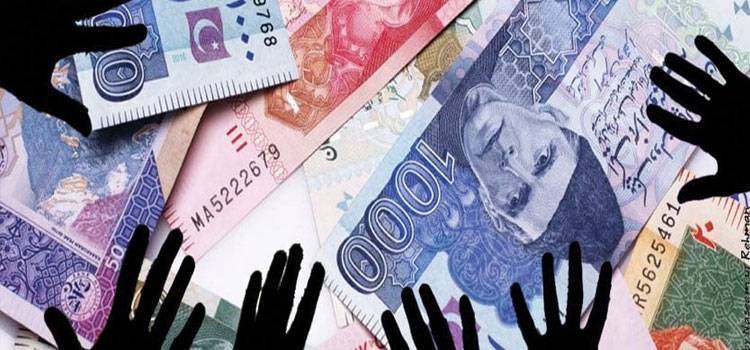
Pakistan has been sinking deeper into corruption, steadily eating away at governance structures and setting the stage for worsening environmental crises. The latest Corruption Perception Index (CPI) by Transparency International lays it all out—Pakistan now ranks 135th out of 180 countries, scoring a dismal 27/100. This downward spiral has not come out of nowhere; it has been building up for years, with governance failures piling up, transparency being pushed aside, and accountability getting stamped out. While the privileged few tighten their grip on power and resources, the vast majority are left to scrape by, struggling against a system rigged against them.
Since 2016, corruption has been eating away at Pakistan’s institutions, fueled by political instability and the weaponisation of accountability. Instead of cracking down on financial misconduct across the board, successive governments have turned anti-corruption efforts into a tool for political engineering. The CPI report lays bare how this pattern has played out under multiple regimes. The Pakistan Muslim League-Nawaz (PML-N) government from 2013 to 2018 tried to paper over governance failures with infrastructure projects, but allegations of misappropriation kept catching up with its leadership. The Pakistan Tehreek-e-Insaf (PTI) government, riding in on an anti-corruption wave, soon found itself tangled up in its political struggles, sidelining institutional reforms in favor of going after opponents. The coalition government that took over in 2022 did little to turn things around, falling back on the same elite-driven policies that have kept corruption firmly in place.
But Pakistan’s descent into corruption did not just spring up in recent years; its roots go way back to colonial rule. The British administration set up an extractive governance model designed to rake in revenue and tighten control over land and water. They carved up the Indus Basin, dismantling the decentralised water management system that had sustained communities for centuries. In its place, they put in rigid irrigation networks meant to boost agricultural exports, cutting off traditional floodplain settlements and leaving millions at the mercy of environmental shocks. Governance became a tool of control rather than empowerment, and instead of breaking away from this system after independence, Pakistan’s ruling elite clung to it, doubling down on elite control while shutting out any attempts to challenge the status quo.
Rather than rolling back colonial-era structures, successive governments kept holding onto them, reinforcing a governance model that puts power in the hands of the few. When the World Bank and other financial institutions stepped in with development funding, they did not shake up the system but instead reinforced it, pumping money into large-scale projects that benefited elite interests while leaving the majority stuck on the margins.
Transparency and accountability need to be built up—not as weapons for political vendettas but as genuine tools for reform
This governance failure has left Pakistan wide open to climate disasters. Transparency International’s latest report spells it out—countries riddled with corruption are often the most vulnerable to environmental risks. In Pakistan’s case, the elite-driven land and water management system has kept pushing aside sustainable practices in favor of projects that serve political and corporate interests. When the devastating floods of 2022 washed over vast parts of the country, it became clear just how badly decades of mismanagement had set Pakistan up for disaster. The government scrambled to roll out relief efforts, but corruption ate into funds, bogging down recovery operations and leaving millions stranded without enough support.
The development model, locked in since colonial times and upheld by every regime since has stopped Pakistan from investing in long-term climate resilience. Instead of restoring floodplains, conserving water, and planning cities with sustainability in mind, governments have kept pushing through projects that serve the interests of a select few while exposing the majority to environmental risks. With land concentrated in the hands of powerful elites, marginalised communities have been forced to settle in high-risk areas, where they bear the brunt of climate disasters. Meanwhile, a lack of transparency in climate financing means that adaptation projects keep getting tied up in bureaucracy or siphoned off by corruption.
Breaking out of this vicious cycle will take more than just surface-level reforms. Pakistan needs to tear down the structures that have locked power and wealth into elite circles while keeping the majority out. Decolonising the country’s development model means stepping away from outdated governance frameworks and shifting toward inclusive decision-making. Transparency and accountability need to be built up—not as weapons for political vendettas but as genuine tools for reform. Progressive taxation should replace the regressive policies that have allowed the rich to hoard wealth while the poor shoulder the economic burden. Devolving power to grassroots communities is key, ensuring that local populations have a say in climate adaptation strategies rather than being bulldozed by top-down decisions.
Equally important is the need to stand up for dissent. Successive regimes have clamped down on activists, journalists, and civil society organisations that have called out corruption and governance failures. This silencing of independent voices has only allowed corruption to dig in deeper, with those in power facing little scrutiny for their actions. A free press and a strong civil society are essential for holding governments accountable and pushing through climate policies that work for the people rather than elite interests.
The latest CPI rankings are more than just numbers; they are a reflection of how deeply corruption has seeped into every aspect of governance, shaping economic policies, environmental resilience, and social stability. Without a fundamental shift in governance—one that prioritises transparency, accountability, and inclusive development—Pakistan will stay trapped in a cycle where corruption fuels climate disasters, and the most vulnerable keep paying the price. But there is a way out. If Pakistan breaks away from elite-controlled governance, puts the power back in the hands of its people, and builds a system that values transparency over-exploitation, it can reclaim its future. The choice is clear—continue down the path of corruption and destruction or stand up for accountability and resilience before it is too late.

